HDTGM: A Conversation With Russell Mulcahy (Director Of THE SHADOW)
We may receive a commission on purchases made from links.
Although you might not recognize the name Russell Mulcahy, you almost definitely would recognize his work. Especially if, like me, you grew up in the 80s. Because Mulcahy directed over 400 music videos during the decade. I spoke with Mulcahy about how that journey began. From directing the first ever music video that appeared on MTV to regularly working with the likes of Duran Duran, Billy Joel and Elton Joel. And then, of course, we chatted about what it was like to make Alec Baldwin a superhero.
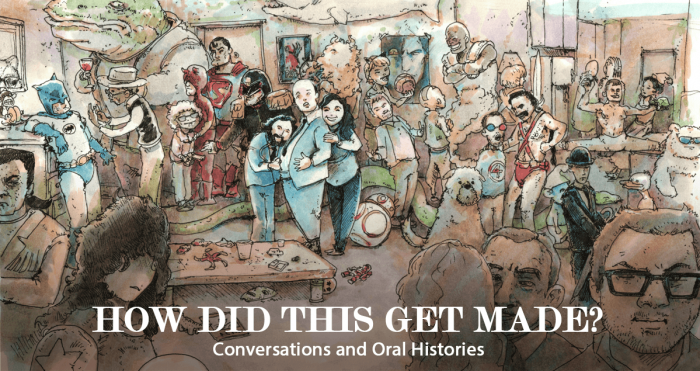 How Did This Get Made is a companion to the podcast How Did This Get Made with Paul Scheer, Jason Mantzoukas and June Diane Raphael which focuses on movies. This regular feature is written by Blake J. Harris, who you might know as the writer of the book Console Wars, soon to be a motion picture produced by Seth Rogen and Evan Goldberg. You can listen to the The Shadow edition of the HDTGM podcast here.
How Did This Get Made is a companion to the podcast How Did This Get Made with Paul Scheer, Jason Mantzoukas and June Diane Raphael which focuses on movies. This regular feature is written by Blake J. Harris, who you might know as the writer of the book Console Wars, soon to be a motion picture produced by Seth Rogen and Evan Goldberg. You can listen to the The Shadow edition of the HDTGM podcast here.
Synopsis: Set in 1930s New York, a reformed criminal (Alex Baldwin) becomes a superhero who is capable of bending the perception of others so that he cannot be seen. Except, of course, for his shadow.Tagline: Who Knows What Evil Lurks in the Hearts of Men?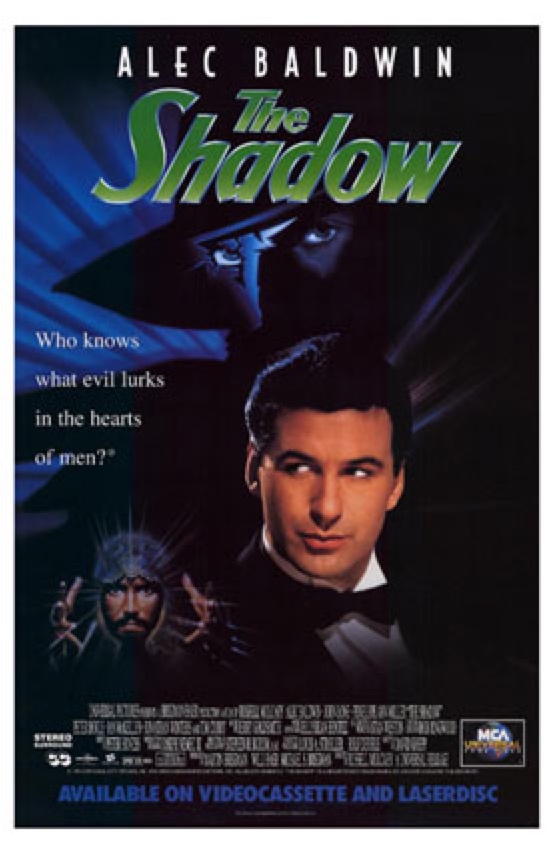 On July 31, 1930, a radio program—Street & Smith's Detective Story Hour—began narrating stories under a persona called "The Shadow." Seven years later, that character was given adapted into a full-fledged radio drama. A 22-year-old Orson Welles starred as Lamont Cranston, a wealthy young man, who travels through East Asia and re-emerges as an invisible avenger called The Shadow. In the following years, The Shadow appeared in several mediums. Most popularly as the star of a 1940's pulp series, but also notably in comic strips, television shows and feature films. In fact, between 1937 and 1958, five different films starring The Shadow were released. But after the last of those five (Invisible Avenger), it seemed that the hero's appeal was gone in a world now full of Batmen and Supermen. Interest to revive the character in a Hollywood film existed for years. But it wasn't until 1982, when Martin Bregman (best known, at that point, for producing Serpico and Dog Day Afternoon) bought the rights to The Shadow that it seemed like a return to the big screen might actually be possible. Not much happened with the project until 1990, when a young screenwriter named David Koepp—who had grown up listening to syndicated versions of the radio drama—put together a script that captured the spirit of the original character, but balanced it with a tone that could appeal to moviegoers 60+ years later. Then, in 1994, Bregman hired an Australian-born director named Russell Mulcahy to direct Koepp's script. Although you might not recognize the name Russell Mulcahy, you almost definitely would recognize his work. Especially if, like me, you grew up in the 80s. Because Mulcahy directed over 400 music videos during the decade. I spoke with Mulcahy about how that journey began. From directing the first ever music video that appeared on MTV to regularly working with the likes of Duran Duran, Billy Joel and Elton Joel. And then, of course, we chatted about what it was like to make Alec Baldwin a superhero
On July 31, 1930, a radio program—Street & Smith's Detective Story Hour—began narrating stories under a persona called "The Shadow." Seven years later, that character was given adapted into a full-fledged radio drama. A 22-year-old Orson Welles starred as Lamont Cranston, a wealthy young man, who travels through East Asia and re-emerges as an invisible avenger called The Shadow. In the following years, The Shadow appeared in several mediums. Most popularly as the star of a 1940's pulp series, but also notably in comic strips, television shows and feature films. In fact, between 1937 and 1958, five different films starring The Shadow were released. But after the last of those five (Invisible Avenger), it seemed that the hero's appeal was gone in a world now full of Batmen and Supermen. Interest to revive the character in a Hollywood film existed for years. But it wasn't until 1982, when Martin Bregman (best known, at that point, for producing Serpico and Dog Day Afternoon) bought the rights to The Shadow that it seemed like a return to the big screen might actually be possible. Not much happened with the project until 1990, when a young screenwriter named David Koepp—who had grown up listening to syndicated versions of the radio drama—put together a script that captured the spirit of the original character, but balanced it with a tone that could appeal to moviegoers 60+ years later. Then, in 1994, Bregman hired an Australian-born director named Russell Mulcahy to direct Koepp's script. Although you might not recognize the name Russell Mulcahy, you almost definitely would recognize his work. Especially if, like me, you grew up in the 80s. Because Mulcahy directed over 400 music videos during the decade. I spoke with Mulcahy about how that journey began. From directing the first ever music video that appeared on MTV to regularly working with the likes of Duran Duran, Billy Joel and Elton Joel. And then, of course, we chatted about what it was like to make Alec Baldwin a superhero
Part 1: In Which The Radio Star is Killed
Blake J. Harris: Before we talk about The Shadow, Highlander or directing all those music videos, tell me a bit about how you first got into filmmaking?Russell Mulcahy: Well, my Mum. She bought me a little second-hand eight-mil camera when I was 14. And I started making short movies. Then I joined a TV station as a film editor and during that time I made two short films—hour-long films—and one of them won the Sydney Film Festival. That was in about 1976. And after that, I started making music videos.Blake J. Harris: What were some of the first music videos you made?Russell Mulcahy: The first ones were in Australia. AC/DC and other bands that you probably don't know. But anyway, Tony Hogarth from Wizard Records sent me to England to do a video. And I went to England in 1979—I'd never been there before—and I did this strange video with Gabo and the Death Cheaters. I was only meant to be there two weeks, but someone saw the video and I ended up staying in England for six years.Blake J. Harris: Oh, wow.Russell Mulcahy: I know! And then they sent me to New York, then LA and I did the video for "Video Killed the Radio Star."Blake J. Harris: Yeah, that's kind of crazy. Such a famous video.Russell Mulcahy: It was a great song. We shot it in a day. I just had this strange concept. I don't know. It was sort of made up on the spot.Blake J. Harris: [laughing]Russell Mulcahy: And it was the video that opened up MTV. I mean, we did this video. We had no idea the impact it would have. We just shot it in a day quickly. And from then on, I then did about 400 videos with Duran Duran, Elton John, Billy Joel, Rolling Stones, whoever. Rod Stewart.Blake J. Harris: That's incredible. And, you know, you were kind of inventing the language of this medium. It was all new. How did you approach that? What did you learn about what kinds of things worked and what kind of stuff didn't work?Russell Mulcahy: Well, it's funny. Before all that I tried to get into the Australian film school. And I made a film—a very strange film—called The Rape of the Republicans. The film school said [laughing] that this was not the sort of films that we want to do. We want to do more socially conscious films, or whatever. So I didn't go to film school. I just kept doing videos and whatever. So I guess I learned my education from just experience. Figuring out what worked and what didn't work.Blake J. Harris: You said earlier that you had no idea about the impact that these videos would have. When did you start to realize that?Russell Mulcahy: Well...I didn't. I was very naïve. I guess that's who I am. But people were always calling me up. Even Diana Ross called me.Blake J. Harris: Oh yeah? Diana Ross?Russell Mulcahy: Weird story. She rang me up and said, "Michael Jackson said that you're the one who should do my video." So I went to meet her at the Royal Albert Hall in England. I said, "I'm here to see Diana." And they said, "You call her Ms. Ross." I knock on the door and she opens the door and she was in half-makeup and ready to go on stage. I said, "Hi, Diana." And she was fine. We had a really good meeting, except there was a speaker on the wall. This old-fashioned speaker. It kept interrupting her to say, "Ms. Ross, you're on stage in 15 minutes. 10 minutes. 5 minutes." She had these huge nails on, but these interruptions were bothering her so she just tore the speaker off the wall.Blake J. Harris: Ha!Russell Mulcahy: And I went: holy shit! Then she said, "Okay, now we can carry on talking." She was so wonderful. And the fact that Michael Jackson recommended me...yeah. It was definitely a time. It was the 80's.Blake Harris: Do you have a favorite video from that era?Russell Mulcahy: I guess The Wild Boys is one of them. A lot of the Duran videos, like Rio, Hungry Like the Wolf, Save a Prayer. I also really like Nicki French's Total Eclipse of the Heart where she called me...[laughing] she saw what I was doing and she called me a pervert. I said, "Yeah, whatever." Then she went back to her trailer and after that video, she rang me up to do more and I said, "No, no, no, no, no. I think our relationship is over."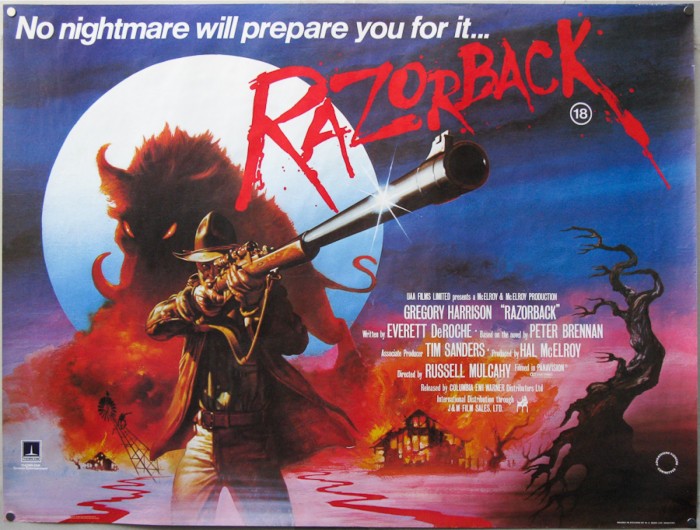
Part 2: There Can Only Be One (aka The Lion’s Shadow)
Blake J. Harris: At some point, while you were directing all those music videos, you started dipping your toe into feature films. How did that happen?Russell Mulcahy: So I was doing, like, a video a week. And then a producer saw one of my videos—I think Hungry Like the Wolf with Duran Duran—and he rang me up in England and asked if I wanted to come to Australia. I've always wanted to direct feature films. And he rang me up and said, "Do you want to come out and do a film in Australia?" And I said, "Yes, yes, yes, yes." Then about ten minutes later I said, "What is it about?" And [laughing] he said, "it's about a giant killer pig." So I went up to Australia and I did Razorback. And then after that I went back to England and did more videos. Then I did another video with Duran called The Wild Boys. And some other producers called me up and said, "Do you want to do a film called Highlander? And I read the script—it was amazing—and so I did Highlander, which was just an extraordinary wonderful experience. You know, with Christophe and Sean. I'm really proud of Highlander. And they keep trying to re-make it...good luck to them. I do not want to be involved. But, yeah, I'm really proud of that one. And it all just traveled on from there. I continued doing more videos, then in the 90s I focused more on features. Like Ricochet. Blue Eyes. The Real McCoy.Blake J. Harris: I liked that one, The Real McCoy.Russell Mulcahy: That was a tough one to make.Blake J. Harris: How come?Russell Mulcahy: Oh god, I don't want to get anyone in trouble. Kim was amazing. Kim Basinger. She is the most wonderful person. And I had great actors like Terence Stamp, he was just extraordinary. But there was one actor—I'm not going to name—who brought Kim to tears. Yeah...that was a tough film.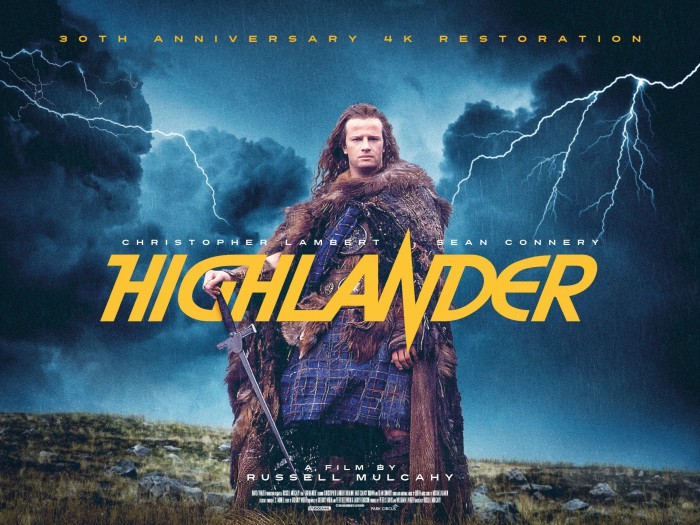 Blake J. Harris: You then followed that up with The Shadow. How did that all come together?Russell Mulcahy: So I was doing The Real McCoy and then the producer Marty Bregman said, "I want you to do The Shadow." You know, it was a good script. And I met Alec with Kim and we got along, so I said: "yes, let's do The Shadow." There was only one big problem with the script, I think.Blake J. Harris: What was that?Russell Mulcahy: Well, so the film is set in the 1930's. And you have a character, Genghis Khan, who comes back and he's going to make an a-bomb. And one of the great things about that film was that I met and became friends with Ian McKellen, who is the dearest man and such a brilliant actor. But I think the problem with the script was you have this character who wants to blow up 1930's New York with an atomic bomb. And I love fantasy films—that's my passion genre; thrillers, horrors—but it sort of didn't make sense when I was filming it. Is that we knew New York [laughing] didn't blow up in the 1930's with an atomic bomb. So it was weird.Blake J. Harris: So what do you do in that situation? While you're shooting?Russell Mulcahy: Well, it was really until after we finished filming that I fully realized: hmmm...maybe that was a problem. But, I mean, we had a great time. Everyone involved—Marty, Alec Baldwin, Tim Curry, Ian McKellen—and we were shooting on the Universal lot, which was a dream come true. It was like: oh my god, I'm filming on a Hollywood film studio lot.Blake J. Harris: What was the studio's reaction to the film? It made its budget back, but I don't know what the expectation was.Russell Mulcahy: I imagine the expectation was a little higher. I think we were like number two when we opened. But we were fighting against The Lion King [laughing].Blake J. Harris: That was a big oneRussell Mulcahy: Yeah, maybe should have been The Lion's Shadow. But I have no regrets on that film. I guess...no, I shouldn't criticize my own films. I shouldn't do that.Blake J. Harris: So I thought it was kind of ironic that here you are, this guy who directed "Video Killed The Radio Star" and you're now making a movie about a former radio star. This character from a 1930's radio show. What was you approach to adapting the character for a modern audience?Russell Mulcahy: I probably didn't have that in mind. Because I guess the producer had, I think he had a slightly different vision of the film than I did. So, for example, with the knife. I wanted that to come to life and be animated. And there was a bit of a struggle in trying to make the film, maybe, a bit more fantastic. I think he wanted to make more of a 40's retro romantic film. And so we did have some discussions about "we should add more fantasy into this film, more effect."Blake J. Harris: So that it would be more like a summer blockbuster?Russell Mulcahy: Yeah. I guess I wanted to make it a bit stranger. And I think he had a different vision. So I think there's sort of a crash of visions.Blake J. Harris: I can see that. There are a lot of elements at play in the film.Russell Mulcahy: It's funny, you know. With Highlander, Razorback and films of that nature, I got a lot of criticism for "throwing in the kitchen sink." I don't know if you're aware of the expression.Blake J. Harris: Yeah, yeah, definitely. I've been criticized myself for doing that as a writer.Russell Mulcahy: [laughs] Yeah? So I got a lot of criticism for that. And Highlander was not a hit in America at first. It wasn't until it went to Europe that it, I don't know, I guess people accepted the slightly outrageous video content and storytelling.
Blake J. Harris: You then followed that up with The Shadow. How did that all come together?Russell Mulcahy: So I was doing The Real McCoy and then the producer Marty Bregman said, "I want you to do The Shadow." You know, it was a good script. And I met Alec with Kim and we got along, so I said: "yes, let's do The Shadow." There was only one big problem with the script, I think.Blake J. Harris: What was that?Russell Mulcahy: Well, so the film is set in the 1930's. And you have a character, Genghis Khan, who comes back and he's going to make an a-bomb. And one of the great things about that film was that I met and became friends with Ian McKellen, who is the dearest man and such a brilliant actor. But I think the problem with the script was you have this character who wants to blow up 1930's New York with an atomic bomb. And I love fantasy films—that's my passion genre; thrillers, horrors—but it sort of didn't make sense when I was filming it. Is that we knew New York [laughing] didn't blow up in the 1930's with an atomic bomb. So it was weird.Blake J. Harris: So what do you do in that situation? While you're shooting?Russell Mulcahy: Well, it was really until after we finished filming that I fully realized: hmmm...maybe that was a problem. But, I mean, we had a great time. Everyone involved—Marty, Alec Baldwin, Tim Curry, Ian McKellen—and we were shooting on the Universal lot, which was a dream come true. It was like: oh my god, I'm filming on a Hollywood film studio lot.Blake J. Harris: What was the studio's reaction to the film? It made its budget back, but I don't know what the expectation was.Russell Mulcahy: I imagine the expectation was a little higher. I think we were like number two when we opened. But we were fighting against The Lion King [laughing].Blake J. Harris: That was a big oneRussell Mulcahy: Yeah, maybe should have been The Lion's Shadow. But I have no regrets on that film. I guess...no, I shouldn't criticize my own films. I shouldn't do that.Blake J. Harris: So I thought it was kind of ironic that here you are, this guy who directed "Video Killed The Radio Star" and you're now making a movie about a former radio star. This character from a 1930's radio show. What was you approach to adapting the character for a modern audience?Russell Mulcahy: I probably didn't have that in mind. Because I guess the producer had, I think he had a slightly different vision of the film than I did. So, for example, with the knife. I wanted that to come to life and be animated. And there was a bit of a struggle in trying to make the film, maybe, a bit more fantastic. I think he wanted to make more of a 40's retro romantic film. And so we did have some discussions about "we should add more fantasy into this film, more effect."Blake J. Harris: So that it would be more like a summer blockbuster?Russell Mulcahy: Yeah. I guess I wanted to make it a bit stranger. And I think he had a different vision. So I think there's sort of a crash of visions.Blake J. Harris: I can see that. There are a lot of elements at play in the film.Russell Mulcahy: It's funny, you know. With Highlander, Razorback and films of that nature, I got a lot of criticism for "throwing in the kitchen sink." I don't know if you're aware of the expression.Blake J. Harris: Yeah, yeah, definitely. I've been criticized myself for doing that as a writer.Russell Mulcahy: [laughs] Yeah? So I got a lot of criticism for that. And Highlander was not a hit in America at first. It wasn't until it went to Europe that it, I don't know, I guess people accepted the slightly outrageous video content and storytelling.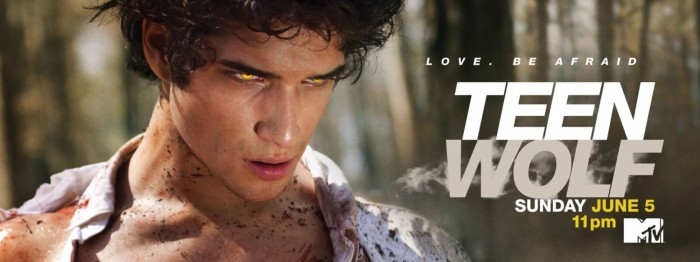
Part 3: Sexy, Surprising, Scary
Russell Mulcahy: I've always remembered this quote from a book that I read as a kid. It was something along the lines of "What's scary is not necessarily what goes bump in the night, but that which whispers at midday." And I've always held that. The day can just be as scary as night.Blake J. Harris: I really like that.Russell Mulcahy: Yeah, it's a good one.Blake J. Harris: Just a couple more questions for you. You're heavily involved with MTV's Teen Wolf; directing more episodes than anyone else, including the pilot. How did you get involved with that?Russell Mulcahy: I'd met [creator] Jeff Davis a few years beforehand. But then I was going off to do a film for Hallmark and, as I pulled into the car park, my agent said they want to talk to you about Teen Wolf. By the time I went in, they were three weeks behind on production. [laughing] I thought to myself: I can't do this. But I was really drawn to the material, there was something really interesting there, so I met with Jeff and showed him some sketches I'd done for an outline. And on the way home, my agent called me up and said, "You have the job." So we went in there, got everything on track and then we were the little train that could. MTV saw the pilot and went: go! You're on. And we've been doing it for six years now and Jeff is one of my closest friends. He had faith in me.Blake J. Harris: When I first heard about the show, I figured it would be much more like the Michael J. Fox film from the 80's. But it's not. It's different...Russell Mulcahy: Yeah, we wanted to create a new vision of Teen Wolf, you know? Everyone had this idea that Teen Wolf was a comedy—which the original film is—and sort of camp, but it's fun. But we wanted to create something sexy, surprising and scary.Blake J. Harris: And you're back working with MTV again! But in a very different capacity. So much has changed. Are you surprised that music videos are not as popular as they used to be? Or do you think that was inevitable?Russell Mulcahy: Well, there's no real outlet for videos anymore. Or, you know, they're not consumed in the same way. There are videos being made, but it's very different. They're all green-screened with CG and whatever. When we did the videos in the 80s—me personally and also people like Steve Barron—we tried to do what we could with what we had.Blake J. Harris: Meaning minimal effects?Russell Mulcahy: Yeah, but not just that. We wanted to not necessarily tell the story of the video or the song, but create an ambience. And I think now, I think that's gone now. There's nothing wrong with that. But I think we were all trying to make mini feature films. I remember when we were making the Duran videos, I would crop the top and bottom of the screen with black. So that it looked more like cinema.Blake J. Harris: That's really cool. I didn't realize that.Russell Mulcahy: Yeah, I wanted to make mini features. And there was a wonderful creative freedom; not necessarily copying the lyrics, but just trying to create emotion. Like the songs, you know? Just like how the song creates an emotion, I wanted the video to create an emotion.
